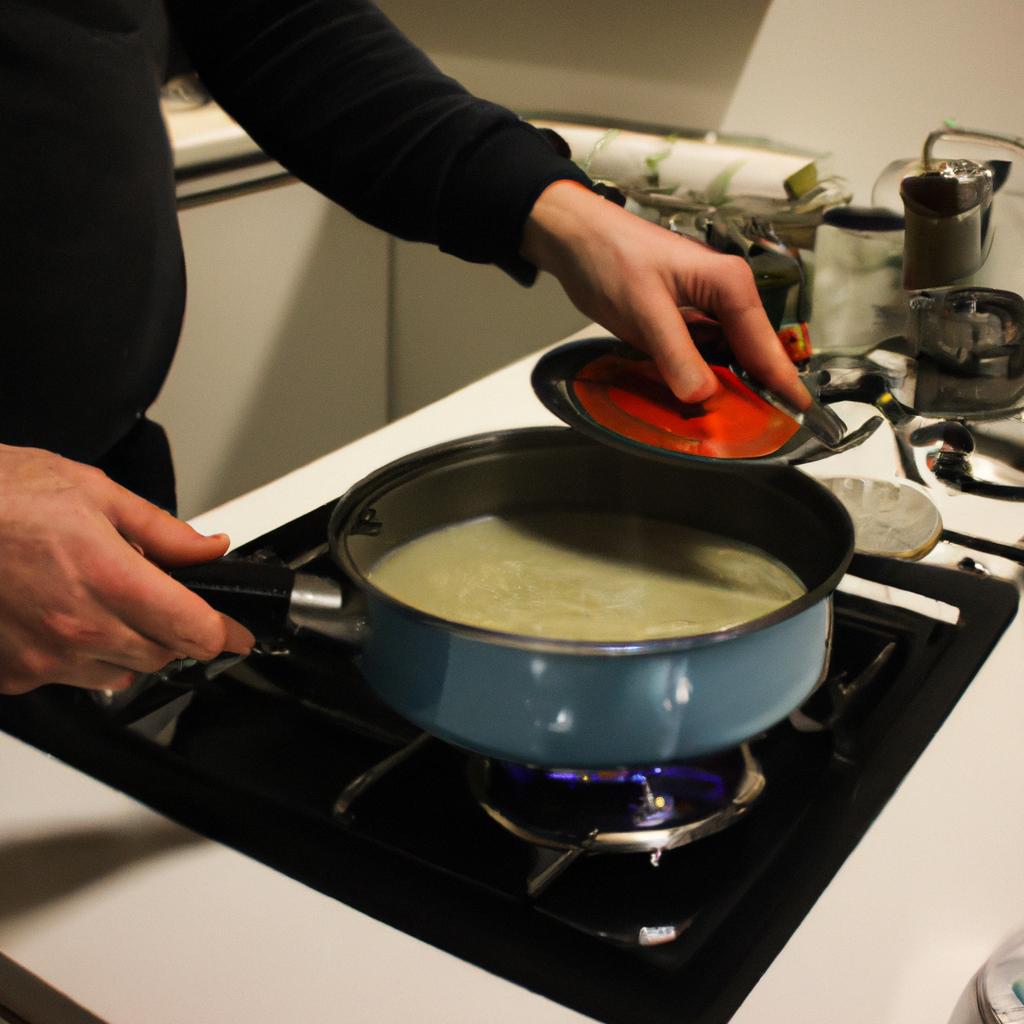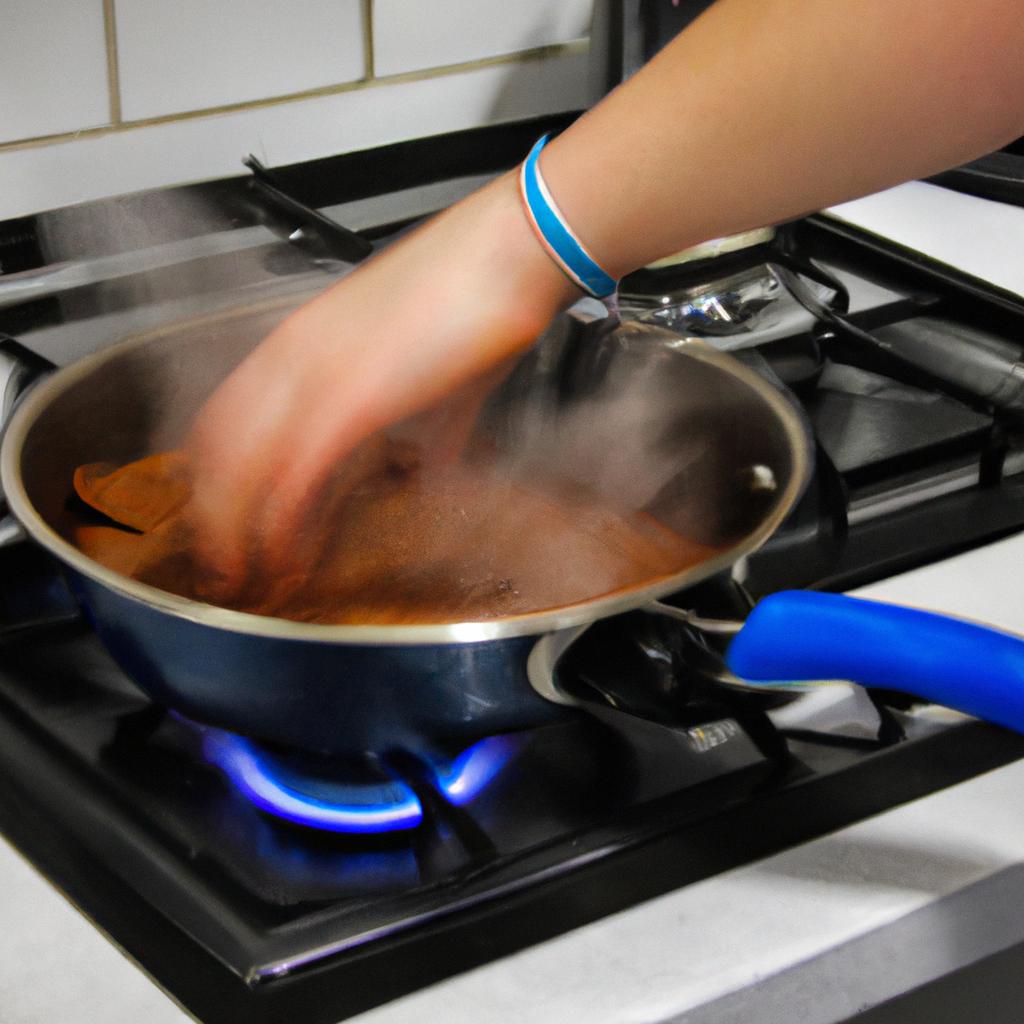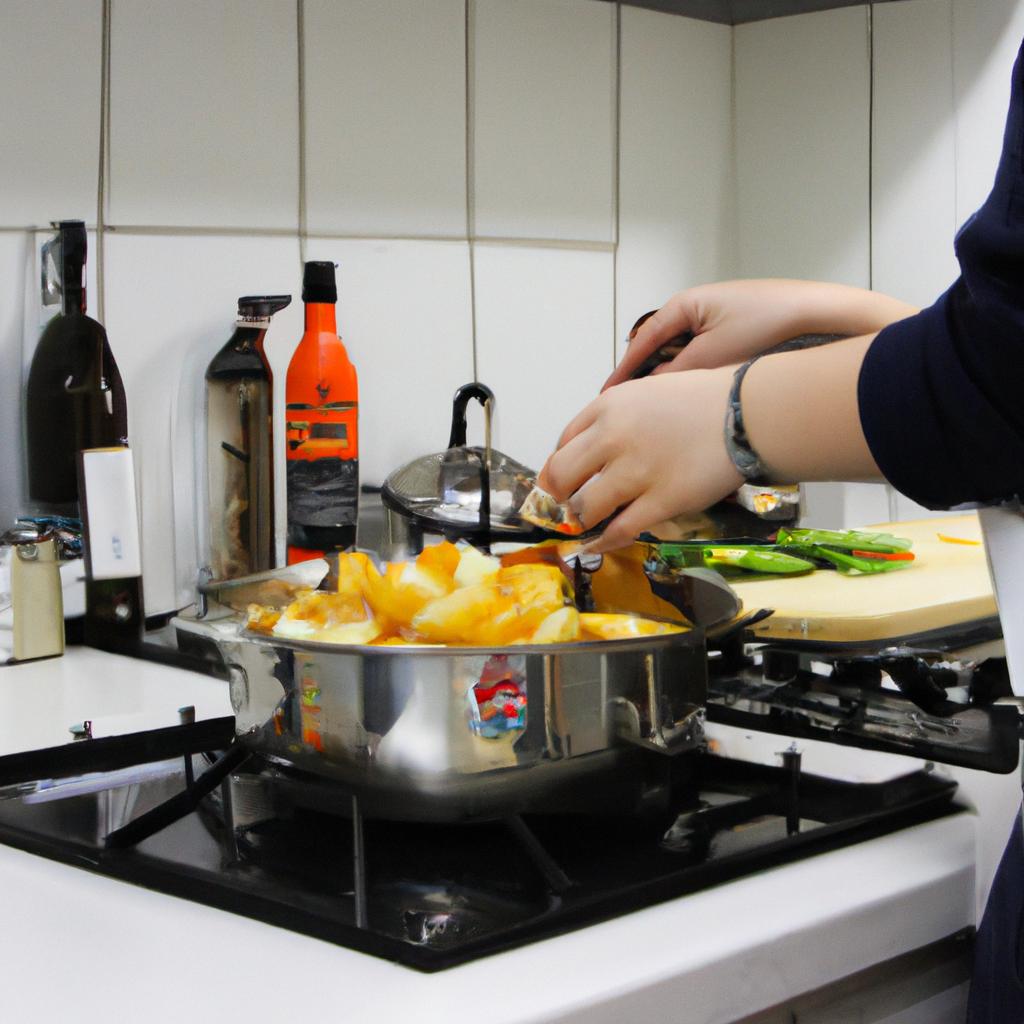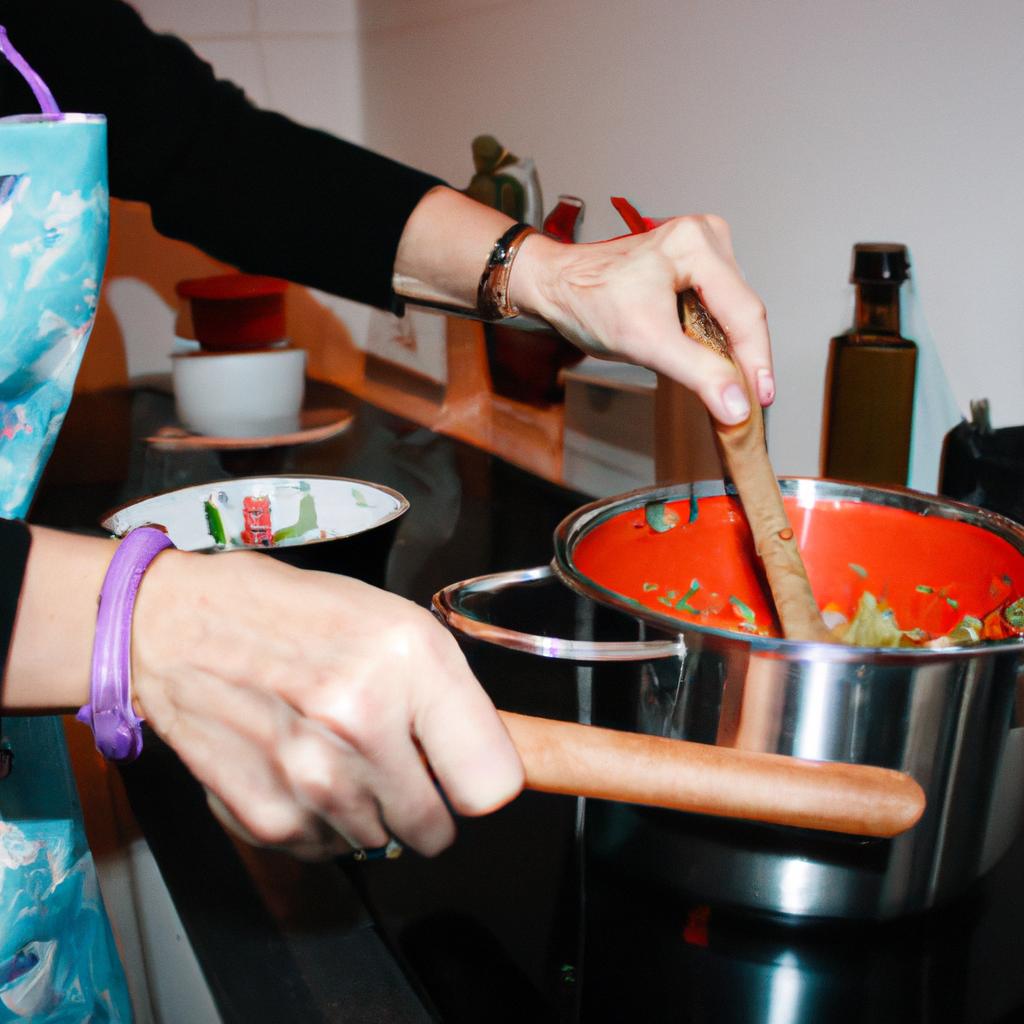In recent years, the culinary industry has witnessed a surge in demand for skilled professionals who possess not only exceptional culinary skills but also a deep understanding of the art and science behind food preparation. However, pursuing a career in the culinary field often requires extensive training, education, and hands-on experience that can be financially challenging for many aspiring chefs. This article explores the various funding opportunities available through Culinary Apprenticeship Grants, aiming to alleviate financial burdens and provide access to quality education and valuable real-world experiences within the realm of recreation and food.
Consider Mary, an ambitious young chef with a passion for recreating traditional flavors from different cultures. Despite her talent and determination, Mary faces financial constraints that hinder her ability to pursue formal culinary training at renowned institutions or gain practical experience at reputable restaurants. Herein lies the importance of Culinary Apprenticeship Grants – they offer individuals like Mary the opportunity to receive comprehensive training under experienced professionals while simultaneously earning an income. By exploring these grant options further, this article aims to shed light on potential solutions for aspiring chefs facing similar challenges, ultimately fostering their development in the ever-evolving world of culinary arts.
Types of culinary apprenticeships
Types of Culinary Apprenticeships
Culinary apprenticeships offer aspiring chefs the opportunity to gain hands-on experience and learn from seasoned professionals in various culinary settings. These apprenticeships are designed to provide a structured learning environment where individuals can develop their skills, knowledge, and techniques in the culinary arts. There are several types of culinary apprenticeships available, each offering unique benefits and opportunities for growth.
One example of a culinary apprenticeship is the traditional or classical apprenticeship model. In this model, apprentices work under the guidance of experienced chefs and kitchen staff in professional kitchens. They learn essential cooking techniques, food preparation methods, and kitchen management skills through practical training and observation. This type of apprenticeship often follows a hierarchical structure, with apprentices starting at lower-level positions such as prep cook or dishwasher before advancing to more specialized roles.
Another type of culinary apprenticeship is the farm-to-table apprenticeship program. With an increasing emphasis on sustainable practices and locally sourced ingredients, these programs focus on educating apprentices about organic farming practices, ingredient sourcing, and seasonal menu planning. Apprentices have the opportunity to work directly on farms or with local producers to understand the journey from farm to plate. This type of apprenticeship not only nurtures culinary skills but also fosters an appreciation for ethical food production and environmental sustainability.
A third option is the international culinary exchange program which offers aspiring chefs the chance to explore different cuisines and cultures around the world. Through this program, participants may travel abroad to work in renowned restaurants or hotels where they can immerse themselves in foreign culinary traditions while honing their craft. Such experiences expose them to diverse flavors, ingredients, cooking techniques, presentation styles, and cultural influences that broaden their perspective on gastronomy.
Participating in a culinary apprenticeship can evoke a range of emotions – excitement for new challenges ahead; anticipation for learning from skilled mentors; passion for creating delicious meals; and ambition towards building a successful career in the culinary industry. The following bullet point list showcases just a few of the emotions that individuals may experience during their apprenticeship journey:
- Eagerness to absorb knowledge and refine culinary skills
- Determination to push boundaries and experiment with new ingredients and techniques
- Frustration when facing setbacks or demanding work environments
- Fulfillment derived from creating memorable dining experiences for guests
Additionally, the table below provides a visual representation of how different types of culinary apprenticeships align with specific emotional responses:
| Type of Apprenticeship | Emotional Response |
|---|---|
| Traditional/Classical | Perseverance |
| Farm-to-table | Connection to Nature |
| International Culinary Exchange | Cultural Exploration |
Aspiring chefs who wish to embark on a culinary apprenticeship should be aware of the qualifications required to secure funding opportunities. In the subsequent section, we will explore these qualifications in detail, ensuring aspiring chefs are well-informed about the requirements they need to meet.
Qualifications for culinary apprenticeship grants
Types of culinary apprenticeships can vary greatly, providing aspiring chefs with a wide range of opportunities to gain hands-on experience in the culinary world. One example is the pastry chef apprenticeship program offered by a renowned restaurant group. This program allows individuals to work alongside experienced pastry chefs while honing their skills in creating delectable desserts and baked goods.
When considering culinary apprenticeships, it is important to note that different programs may have specific requirements and focus areas. Here are some common types of culinary apprenticeships:
-
Traditional Apprenticeships: These programs follow a structured approach, combining classroom instruction with on-the-job training. Participants learn various techniques and principles of cooking under the guidance of experienced chefs.
-
Specialty Apprenticeships: Some apprenticeships focus on specific culinary specialties such as baking and pastry arts, butchery, or international cuisine. These specialized programs provide an opportunity for individuals to develop expertise in their chosen field.
-
Restaurant-based Apprenticeships: Many restaurants offer their own apprenticeship programs, allowing individuals to become immersed in the fast-paced environment of professional kitchens. Participants work closely with skilled chefs, gaining practical knowledge about menu planning, food preparation, and kitchen management.
-
Hotel or Resort Apprenticeships: Culinary apprenticeships in hotels or resorts often provide comprehensive training across multiple departments within the hospitality industry. Participants may rotate through different kitchen stations and gain exposure to banquet operations, fine dining establishments, or catering services.
To further illustrate the diversity of available apprenticeship options, consider the following table showcasing various types of culinary apprenticeships:
| Type | Description |
|---|---|
| Traditional | Comprehensive training blending theoretical learning with practical experience |
| Specialty | Focused on particular areas like baking and pastry arts, butchery, or international cuisine |
| Restaurant-based | Immersive experiences working directly in professional kitchens |
| Hotel or Resort | Multifaceted training across different departments within the hospitality industry |
This variety in culinary apprenticeships allows individuals to choose a program that aligns with their interests and career goals. By selecting an apprenticeship that caters to their specific aspirations, aspiring chefs can tailor their learning experiences to gain expertise in areas they are passionate about.
Transitioning seamlessly into the subsequent section on how to apply for culinary apprenticeship grants, it is important for individuals interested in pursuing these opportunities to understand the qualifications needed and the application process. By meeting eligibility requirements and submitting a strong application, aspiring chefs can increase their chances of securing funding to support their culinary education journey.
How to apply for culinary apprenticeship grants
Qualifications for culinary apprenticeship grants lay the foundation for eligible candidates to pursue funding opportunities in recreation and food. To ensure a fair selection process, grant providers establish specific criteria that applicants must meet. Let’s delve into some common qualifications required for culinary apprenticeship grants.
One example of a qualification is having prior experience or education in the field of culinary arts. For instance, Grant Provider A may require applicants to have completed a certification program or hold a degree in culinary arts from an accredited institution. This requirement ensures that individuals applying for the grant possess the necessary knowledge and skills to benefit from the apprenticeship program.
In addition to educational background, financial need can also be a qualifying factor for culinary apprenticeship grants. Grant Provider B might prioritize supporting candidates who demonstrate limited financial resources but display exceptional talent and passion for pursuing a career in the culinary industry. By considering financial need as part of their evaluation process, these grant providers aim to provide opportunities to those who may not otherwise have access to such programs.
Here are some general qualifications frequently sought by grant providers in this sector:
- Demonstrated commitment and enthusiasm towards a career in cooking
- Strong work ethic and dedication to learning
- Excellent communication and teamwork skills
- Ability to handle high-pressure environments
These qualifications act as guidelines for grant providers when selecting recipients who will make the most of the opportunity provided through culinary apprenticeship grants.
To further emphasize the importance of meeting these qualifications, let’s visualize how they impact aspiring chefs’ chances of receiving funding through a table:
| Qualification | Impact on Application Evaluation |
|---|---|
| Culinary Education | Enhances chances of being selected |
| Financial Need | May increase likelihood of consideration |
| Commitment & Passion | Positively influences application review |
| Skills & Experience | Strengthens overall candidacy |
By fulfilling these requirements, applicants position themselves favorably during the selection process, increasing their chances of being awarded culinary apprenticeship grants.
In the upcoming section about “Important documents needed for grant applications,” we will explore the necessary paperwork and materials applicants must gather to complete a comprehensive submission. This step is crucial as it ensures that all required information is provided and helps streamline the application process.
Important documents needed for grant applications
Culinary apprenticeship grants provide aspiring chefs and culinary enthusiasts with invaluable financial support to pursue their passion for food. In the previous section, we discussed how to apply for these grants. Now, let’s delve into the crucial documents that are required during the application process.
To better understand the importance of these documents, let’s consider a hypothetical case study: Sarah, an ambitious individual seeking a culinary apprenticeship grant, wants to showcase her skills and dedication in her application. She gathers all the necessary paperwork before submitting her application.
When applying for a culinary apprenticeship grant, there are several important documents you need to include:
- Proof of Identity: A copy of your identification document (such as a passport or driver’s license) is essential to confirm your identity.
- Educational Certificates: Provide copies of any relevant educational certificates or diplomas that demonstrate your qualifications and commitment to pursuing a career in cooking or gastronomy.
- Letters of Recommendation: Request letters from individuals who can attest to your character, work ethic, and potential as a chef. These could be former employers, teachers, or mentors within the culinary industry.
- Personal Statement: Craft a compelling personal statement explaining why you deserve the grant and detailing your aspirations in the culinary field. This is an opportunity to highlight your unique qualities and motivations.
Including these essential documents will enhance your chances of securing a culinary apprenticeship grant by showcasing your commitment and dedication towards this profession.
Now that we have explored the significance of these documents in detail, it is time to move on to discussing another vital aspect—deadlines for submitting applications for culinary apprenticeship grants. By understanding these deadlines, you can ensure timely submission of your materials and increase your chances of success in obtaining funding for your culinary journey
Deadlines for culinary apprenticeship grant applications
Now that we have discussed the funding opportunities available for culinary apprenticeships, let us delve into the important documents required when applying for these grants. To provide a practical example, consider a hypothetical case of Jane, an aspiring chef who wishes to pursue a culinary apprenticeship through a grant program.
Paragraph 1:
To begin her application process, Jane must gather several crucial documents. These include:
- A completed application form: This serves as the initial step in applying for any grant and provides essential information about the applicant.
- Proof of eligibility: Grants often require applicants to meet specific criteria such as age restrictions or residency requirements. Providing necessary documentation to verify eligibility is vital.
- Letters of recommendation: These testimonials from experienced professionals within the culinary field can greatly enhance an applicant’s chances of securing a grant. They highlight an individual’s skills, passion, and potential contributions to the industry.
- Personal statement or essay: This document allows Jane to express her motivation behind pursuing a culinary apprenticeship and showcase her dedication and commitment towards honing her craft.
The submission of these documents not only demonstrates one’s preparedness but also creates a positive impression on the selection committee. It is recommended that applicants pay close attention to detail while preparing their applications by ensuring all requested materials are included. Additionally, it is advisable to proofread each document thoroughly before submission.
| Document | Purpose |
|---|---|
| Application form | Provides essential applicant information |
| Proof of eligibility | Verifies whether applicant meets criteria |
| Letters of recommendation | Validates skills and potential |
| Personal statement/essay | Expresses motivation and commitment |
Paragraph 2:
By submitting these documents together with her application, Jane increases her likelihood of being considered for the culinary apprenticeship grant she desires. However, it is crucial to note that the importance of each document may vary depending on the specific grant program. Therefore, applicants should thoroughly review the requirements outlined by each funding opportunity to ensure they are providing all necessary materials.
Paragraph 3:
Understanding which documents are essential for a culinary apprenticeship grant application is an important step towards securing funding. By meticulously preparing and organizing these documents, aspiring chefs like Jane can effectively demonstrate their commitment to their craft and increase their chances of success in obtaining financial support for their culinary journey.
With a clear understanding of the required documents, let us now explore some helpful tips that can contribute to a successful culinary apprenticeship grant application.
Tips for a successful culinary apprenticeship grant application
Deadlines for Culinary Apprenticeship Grant Applications
While it is crucial to understand the deadlines for culinary apprenticeship grant applications, it is equally important to recognize that different funding opportunities may have varying timelines. One example of such a deadline is the Chef’s Foundation Grant, which aims to support aspiring chefs with financial assistance throughout their apprenticeship journey.
The application period for the Chef’s Foundation Grant typically opens on January 1st and closes on March 31st each year. During this time frame, prospective applicants are encouraged to gather all necessary documentation and submit their completed applications before the deadline. It is essential to note that late submissions will not be accepted, so ensure ample time for preparation.
- Missing a deadline can result in disqualification from receiving funding.
- Early submission allows for any potential errors or omissions to be rectified before the closing date.
- Submitting close to the deadline may cause additional stress and rush when compiling required materials.
- Meeting application deadlines demonstrates professionalism and commitment.
To provide a comprehensive overview of various grant options available, here is an illustrative table showcasing four popular culinary apprenticeship grants along with their respective application periods and award amounts:
| Grant Name | Application Period | Award Amount |
|---|---|---|
| Chef’s Foundation Grant | Jan 1 – Mar 31 | $5,000 |
| Culinary Arts Scholarship | Apr 1 – May 30 | $10,000 |
| Gastronomy Education Fund | Jun 15 – Aug 15 | $7,500 |
| Master Chefs Apprenticeship | Sep 1 – Oct 31 | $8,000 |
By familiarizing oneself with these grant programs’ specific deadlines, aspiring culinary professionals can optimize their chances of securing financial support for their apprenticeship endeavors.
In summary, understanding the deadlines associated with culinary apprenticeship grant applications is essential to ensure eligibility and maximize opportunities. The Chef’s Foundation Grant serves as an example of a grant program with specific application periods. Adhering to these timelines not only prevents disqualification but also allows ample time for preparation and showcases professionalism. Additionally, the provided table highlights various grants’ application periods and award amounts, further aiding prospective applicants in making informed decisions.
 Refoksa
Refoksa



